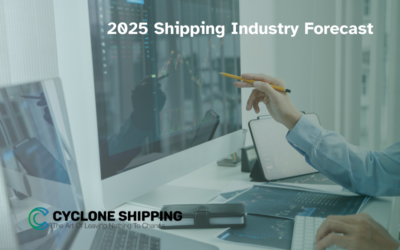If you haven’t already noticed how prevalent artificial intelligence (AI) is in the world, you haven’t been paying attention. But what about the implications of AI in global shipping? The truth is that it is already becoming an integrated tool for carriers, ports, freight forwarders, and logistics providers. The current and forecasted future use of AI across the shipping industry aims to improve efficiency and transparency while better managing everyday risks. Of course, with anything positive, there are also potential challenges, such as how shippers and forwarders will navigate automated systems, re-booking complications, and hidden costs.
The fact that more than 80% of global trade is transported by sea means that staying up with technology will only benefit carriers, freight forwarders, and ultimately, consumers.
Where AI Is Making Headway
First, let’s explore where you’ll already find a strong integration of AI in global shipping.
Predictive Maintenance, Fuel, and Environmental Optimization
Ships and fleet operators are leveraging AI to monitor engine health, fuel use, deviation from planned routing, and environmental parameters. Autonomous shipping startup Orca AI’s recent study illustrated that better route planning and avoidance of deviations could reduce 47 million tons of emissions annually, which would lead to about $100,000 in fuel cost savings per vessel and reduce the chances of ocean collisions 33%.
AI is also being combined with real-time data, such as automatic identification systems (AIS), weather, and port schedules, to optimize ship routing. This leads to a reduction in fuel usage and improved predictability of delivery.
Autonomous / Minimal-Crew Vessels and Smart Ports
The world’s first autonomous electric cargo ship launched in 2022 from Norway, leading to more of these, as well as their close cousins, semi-autonomous ships. Together, they are often referred to as maritime autonomous surface ships (MASS). These electric cargo ships produce zero emissions and, because they are void (or mostly void) of crews, reduce labor costs and potential human errors.
In Texas, the Port of Corpus Christi is integrating AI in combination with a digital replica of the port to track ships. The port has also developed an AI-enhanced command center called Overall Port Tactical Information System, or OPTICS, which allows authorities to leverage real-time information to improve decision making.
Forecasting, Customer Service, and Booking Automation
Many firms have built, are in the process of building, automated systems. Some have purchased ready-made solutions. Either way, these are used for basic booking, quoting, order tracking, and rate calculations. This smart technology streamlines common tasks and reduces manual labor, which comes with an associated decline in errors.
Hidden Costs and Complexities for Shippers and Forwarders
Even as AI brings efficiency for carriers, shippers and freight forwarders often experience friction, especially when things don’t go according to plan. For instance, rigid automated systems can handle standard bookings well, but when rebooking is needed due to port delays, vessel schedule changes, or customs issues, automated-only interfaces often don’t adapt well. Human intervention becomes necessary—but the system may funnel requests through low-bandwidth support or require many steps.
When considering the costs associated with integrating AI in global shipping, they are certainly not trivial. Implementing enterprise-grade AI platforms constitutes an investment that ranges from hundreds of thousands to millions of dollars. And that doesn’t include ongoing maintenance, data pipelines, and staff training.
Data quality and integration remain major barriers to completely embracing AI. Remember that the models are only as good as the data they’re given, and many shipping-oriented systems have legacy tools, siloed information, or gaps in tracking. These gaps can lead to incorrect predictions, mis-routing, or over- or under-booking.
Practical Examples of AI in Global Shipping
As discussed previously, the Port of Corpus Christi is using their OPTICS system to improve situational awareness and predict operations and safety measures. Other companies and locations are also using AI in their everyday activities:
- HappyRobot is a startup company that automates communications, including rate negotiations and appointment scheduling, for freight operators. It counts among its clients some large logistics firms that use AI agents to reduce manual workload in routine tasks.
- Busan Port, located in South Korea, is in the process of developing and integrating a black box to help prevent ocean collisions on AI-based small vessels and personal watercraft. They are also leveraging AI across their framework to predict arrival times, plan port operations, and monitor emissions, all of which leads to higher revenue and better on-time deliveries.
Where AI in Global Shipping Is Headed
As AI continues to emerge and become more widely used, we can expect several advances in global shipping. These may include:
- More autonomous or semi-autonomous vessels.
- Smarter port operations based on better real-time planning.
- Using AI to predict tariffs, analyze contract risks, and provide real-time pricing.
- Greater focus on environmental, social, and governance (ESG) metrics, which include emissions tracking, transparent routing, and fuel usage.
AI in global shipping is transforming many facets of how cargo moves, from route optimization and predictive maintenance to customer service automation. The efficiency gains are real, and cost savings—particularly in fuel, emissions, and operational oversight—are increasingly measurable. But there will always be trade-offs. These include investment cost, system rigidity, risk when things go off script, and the cost of making AI tools coordinate with humans and complex real-world disruption.
As a freight forwarder, our goal at Cyclone Shipping is to understand where AI works best and balance that with strong human relationships and flexibility wherever exceptions arise. If you’re curious how we’re leveraging AI in global shipping to improve your on-time delivery rates, contact us. We’d love to talk.




